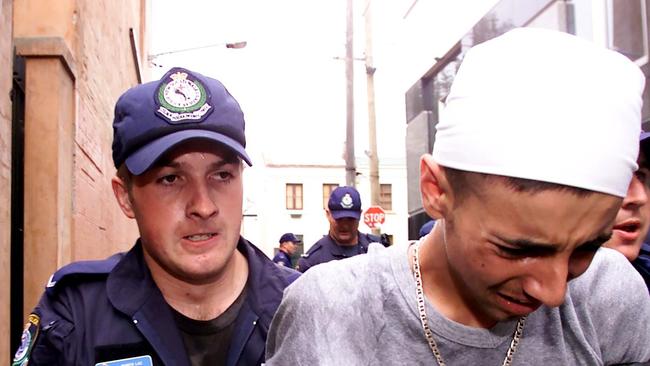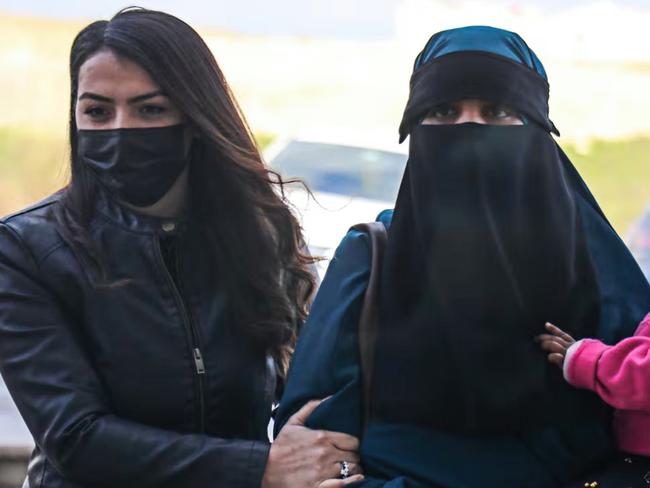High Court ruling on Delil Alexander puts citizenship front and centre of Islamic State debate
The government must now work out how to stop wannabe terrorists returning to Australia.

Islamic State’s plans for a caliphate ended in the dusty fields of Baghouz in March 2019. However, the human and legal legacy of their brutal adventure will continue to be felt for years to come.
The latest episode played out in Canberra this week as the High Court ruled the legislation under which the then-government ended the Australian citizenship of Delil Alexander and left him just a Turkish citizen was unconstitutional.
The High Court documents reveal two different versions of Alexander’s presence in Syria. According to his sister (who operated as his litigation guardian), Alexander left Australia on April 16, 2013, travelled to Idlib in Syria to marry someone, tried to return to Australia but became stuck in Syria because of “road closures”. Four-and-a-half years later, he was somehow detained by Kurdish militia 500km from Idlib, in Deir az-Zour province, and handed over to the Syrian government.
According to Australian authorities, Alexander was part of a larger group of individuals whose trip to Syria was arranged by the convicted foreign fighter facilitator Hamdi al-Qudsi. Alexander was also allegedly a close associate of Muhammad al-Baryalei who was a key member of the al-Qudsi network, and who was killed fighting for Islamic State. Baryalei entered Syria the same month Alexander left Australia. The authorities also determined that Alexander had likely joined Islamic State by August 2013. Although not mentioned in the court documents, Alexander’s capture in Deir az-Zour province in November 2017 coincided with a major Syrian government military operation, backed by Russian forces and pro-government militias, to re-take the province from Islamic State control.
At the moment the particular piece of legislation to which the High Court decision applies only impacts one other person whose citizenship has been cancelled. However, up to 20 individuals are believed to have had their citizenship ceased, including at least one person who has been killed. It is likely that there will be other challenges to the legality of aspects of the Citizenship Act under which citizenship may be ceased.

Citizenship cessation has been criticised by a number of legal academics, and there are practical issues such as the ability to monitor and, in some instances, charge individuals with offences if they are no longer citizens. And because it can be applied only to dual citizens, or those capable of being granted another citizenship, it is criticised as creating two classes of citizenship and essentially handing the problem over to someone else.
That “someone else” is often taken by surprise because of the secrecy with which the determination is normally carried out.
New Zealand wasn’t pleased when Suhayra Aden’s citizenship was cancelled, while Fiji has maintained Neil Prakash isn’t eligible for Fijian citizenship after his Australian citizenship was cancelled.
The UK has had a similar issue with Bangladesh when they cancelled Shamima Begum’s citizenship. So, given this, why should a government undertake such punitive action? To begin with, the High Court didn’t say that the government couldn’t cease someone’s citizenship based on their actions against Australia. As it noted in its ruling: “ … it cannot be said that it was not open to parliament to provide that such conduct voluntarily undertaken might be so incompatible with the values of the Australian people as to be seen to be incompatible with continued membership of the Australian body politic.”
The High Court had a problem not with the cessation per se, but with the process by which that decision was arrived at.
Secondly, a 2015 poll conducted at the time the Abbott government was discussing legislation aimed at ceasing the citizenship of those taking part in terrorist activities showed overwhelming support among voters for such action. So it would appear that the Australian body politic also supports the idea that individuals should be denied citizenship because of their active support for groups that seek to attack Australia and Australians.
Lastly, some of our closest allies hold a similar view regarding the obligations of citizenship and have shown a willingness to cease the citizenship of individuals who support armed non-state actors involved in attacks on fellow citizens. These countries include Britain, Canada, the Netherlands, Belgium and Denmark.
The High Court’s decision provides the first real domestic security policy challenge for the new government. Both the Attorney-General Mark Dreyfus and the Minister for Home Affairs Claire O’Neil have said they are assessing the ruling’s impact.
With an Opposition that likes to burnish its national security credentials and now led by a person who created the Department of Home Affairs, as well as the general support among the population for a policy of citizenship cessation for terrorist supporters, there is sure to be some heat applied to the government to address the High Court’s decision. Does the government return Alexander to Australia and seek to have him tried in court and then cease his citizenship if he is found guilty? Is it feasible to do so? What is the political cost of not doing it?
More broadly, the government has inherited the logistic and legal mess created in the aftermath of Islamic State’s defeat. Australian and ex-Australian citizens, along with dozens of children of Australian and foreign fathers and mothers, remain in camps in Syria, or detention facilities in Turkey and Iraq. Arrest warrants have been issued for many of the adults. There is also pressure from the US and their Kurdish jailers for countries to return their citizens.
Some countries have done so, some have done it to a limited degree, and others such as Australia have, or had, a general policy of not doing so at the moment. While the present government talks about the use of Temporary Exclusion Orders to protect Australians from the threat posed by our detained Islamic State supporters, its utility is – as the name notes – only a temporary solution.
The High Court’s decision has presented the new government with a problem. However, it may also give it the impetus it needs to resolve the bigger issue of what to do with the men, women and children who remain detained overseas for their role in the chimeric dream of a modern-day caliphate.
Rodger Shanahan is a non-resident fellow at the Lowy Institute.



To join the conversation, please log in. Don't have an account? Register
Join the conversation, you are commenting as Logout